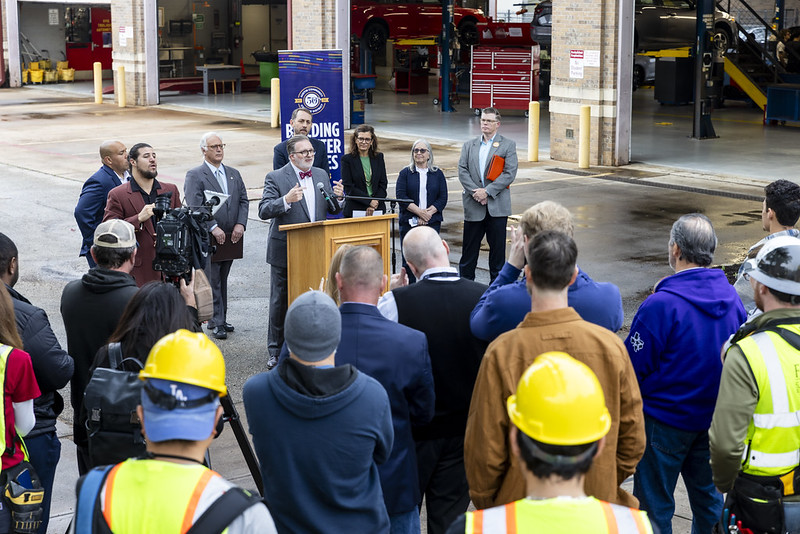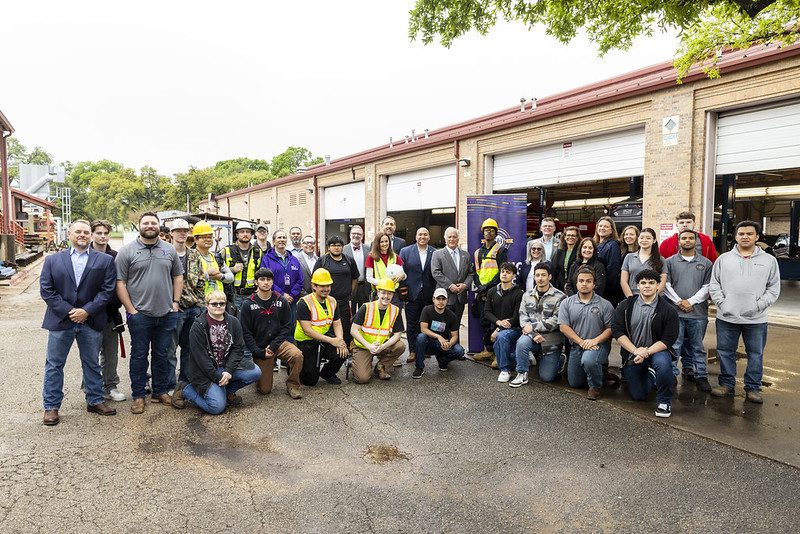The recently announced Austin Infrastructure Academy takes a significant step forward with the establishment of a physical presence at Austin Community College District (ACC).
On Friday, March 22, Austin Mayor Kirk Watson hosted a press conference at the college’s Riverside Campus to announce the new development. View photos from the event here.
“ACC is a gem in our community and adds so much to Central Texas. They have a proven history of building the training programs our employers are looking for and the educational pathways that lead to family-supporting careers — not just jobs. I am confident that through our work together, in the coming months of engagement will result in a best-in-class Infrastructure Academy that truly creates opportunities and changes lives right here in Austin, Texas,” says Mayor Watson.
“ACC is the number one workforce trainer in our region. It’s our purpose and mission to create the educational and training programs that can lead Central Texans into well-paying, promising careers. We’re proud to join the city and the entire coalition of partners to support the Austin Infrastructure Academy,“ says ACC Chancellor Dr. Russell Lowery-Hart. “We’re starting first at our Riverside Campus where we have the facilities we need to upskill and train students immediately in programs like welding, construction, heavy-machinery operation, electric fleet maintenance, and HVAC. But this is just the beginning. Our vision is to create a permanent home base for the Academy at our land in Southeast Travis County.”

Travis County Judge Andy Brown, Austin Councilmembers José Velásquez and Leslie Pool, Laborers’ International Union of North America (LiUNA) representative Jeremy Hendricks, and vice president/Austin metro executive for consulting firm AECOM, Karen Campbell, joined the press event.
“I am excited about the partnerships that have gotten us to today and even more excited about the work ahead. The Academy will be a significant step forward in the emerging public-private network that integrates recruitment, training, and student support. Ultimately, it will help local students access mobility and construction careers,” says Mayor Watson.
The Austin Infrastructure Academy integrates seamlessly into ACC’s campus plans. In 2022, ACC voters approved a General Obligation bond that included the construction of a skilled trades campus at the college’s Southeast Travis County land — located near the Austin-Bergstrom International Airport.
About the Academy
The Austin City Council voted in early March 2024 to launch the Infrastructure Academy. It’s part of a $25 billion investment in mobility infrastructure which includes Project Connect, a planned airport expansion, IH-35 reconstruction, and other infrastructure projects.
The Academy will be a training hub that will contribute to an already robust network of community-based and union-based training programs.
Planning for the Academy will be a collaborative process that will continue over the coming months. Programs created and offered through the Academy will be designed to support real-time needs identified by both job creators and job seekers. It will include both education and training as well as support services to help guide students from training to job placement.
Why It’s Needed
In 2023, Workforce Solutions Capital Area developed a comprehensive needs analysis that determined the local talent pipeline would need to train and upskill an additional 4,000 workers each year beyond what we currently are producing to meet the needs of the mobility projects.
“Our region continues to be one of the fastest-growing in the country,” says Judge Brown. “Many workers, job seekers, and employers across Texas are looking to (our region) as an example, not only as a jobs creator but also as a model for how a community can come together to upskill workers, assist employers, and support working families.”
The Austin Infrastructure Academy stems from a yearlong public-private collaboration led by Mayor Watson and Judge Brown. The Mobility & Infrastructure Partnership brought together representatives from public project sponsors, job creators, workforce training providers, and local trade unions to ensure local residents have the means to create careers and financial security for their families.

